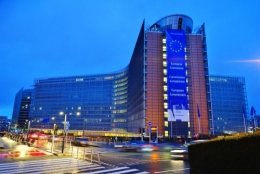European Economic
and Social Committee
Recovery and reconstruction after the pandemic must be the priority for the future of Europe
To provide the European Commission with a valuable contribution to its 2022 work programme, the European Economic and Social Committee (EESC) has adopted a Resolution. This timely and important document addresses the main issues around using investment and reforms to overcome the economic and social crisis caused by the COVID-19 pandemic.
Putting the European economy on the right track for sustainable transition, growth and employment, and bringing prosperity to Europeans and European organisations and companies must remain the top EU economic policy priorities for the near future. This is the underlying idea of the Resolution on the EESC's contribution to the European Commission's 2022 Work Programme, adopted at the EESC's June plenary session.
The Resolution states that the two watchwords after the pandemic should be 'recovery' and 'reconstruction' and that both investment and reforms should be used to overcome the economic and social crisis, reinforcing Europe's resilience to future shocks, based on inclusive and sustainable growth, decent work and social justice. The main pillars should be: unlocking the full potential of the Single Market; achieving the Sustainable Development Goals (SDGs); creating a circular economy and achieving climate neutrality in the EU by 2050 at the latest, as well as ensuring good governance and democratic accountability.
According to the EESC, all EU policies should be rooted in the goals and values of the Union, laid out in the Lisbon Treaty and the EU Charter of fundamental rights, namely: human dignity, freedom, democracy, equality, the rule of law and human rights.
Commenting on the adoption of the Resolution, Christa Schweng, EESC president, said I trust that the EESC's recommendations, which we have delivered well in advance, will provide valuable input to the forthcoming Commission work programme. The Committee remains fully committed to supporting the Commission's six headline ambitions and to fulfilling its role by facilitating dialogue within civil society and with the European institutions in order to turn these ambitions into reality
.
Ms Schweng also added that the participation of all citizens, through civil society organisations, would put the process of recovery and reshaping the future of Europe on a truly democratic basis: I count on the Commission to take on board the proposals of European organised civil society when preparing next year's priorities
.
Europe's future goes hand in hand with a vibrant civil society
In its resolution, the Committee calls on the Commission to give civil society organisations proper and targeted support and recognition and, in this way, to preserve the essential civic space and democratic right to association. A vibrant organised civil society lies at the heart of the European Union, the European way of life being characterised by a sense of fairness, justice and solidarity, and an understanding of the need to contribute to the common good for the benefit of all.
Better implementation of the Treaty on European Union's Article 11(2), which covers civil dialogue, is therefore now needed more than ever before. Civil society organisations must be key and equal partners in decision-making in the complex process of deciding the future of a post-pandemic Europe. No one must be left behind, especially the most vulnerable.
The EESC Resolution is timely
The Resolution was drafted by EESC members Mariya Mincheva (Employers Group), Stefano Palmieri (Workers Group) and Jan Dirx (Diversity Europe Group) and makes a timely contribution before the Commission approves its work programme for next year.
Speaking during the debate, Ms Mincheva underlined that Economic and social progress are firmly intertwined. A strong economic base and value creation are key to generating sustainable development and maintaining the ambitious European social model. Social policies and measures aimed at boosting economic development need to be closely connected, as they contribute equally to the common good
.
Mr Palmieri stated that The social agenda must lead the EU programme for 2022, turning the social pillar into tangible rights, ensuring a fair recovery and not simply a 'return to normal'. Decent work should be the default option, seizing the opportunities of the digital and green transition to ensure adequate wages, developing effective inclusion schemes at EU and national level, and exploring options for minimum income
.
Lastly, Mr Dirx emphasised that Now it is time for the Commission's work programme to focus on restructuring and improving our economy and society, based on our values. The core European principles of Article 2, such as democracy, the rule of law and fundamental rights, including civic space, are closely linked. The way the EU legislates must be more transparent, more open to input from stakeholders and easier to understand. We need a clear strategy for active citizenship
.
Background
In January 2021, the EESC Bureau set up an ad hoc group to draft the Committee's contribution to the European Commission's 2022 Work Programme. The group was composed of three co‑rapporteurs, who worked in close consultation with the section/CCMI presidents and the Liaison Group.
The final document, in the form of a resolution, was structured around the six priorities of Commission President Ursula von der Leyen's strategic agenda: the European Green Deal, A Europe fit for the digital age, An economy that works for people, A stronger Europe in the world, Promoting our European way of life and A new push for European democracy.
For more information on the Resolution, please consult our website.

